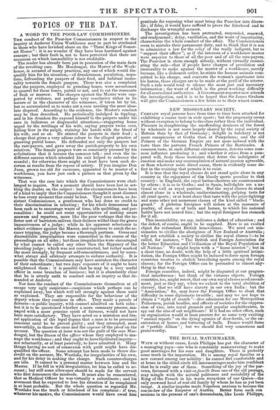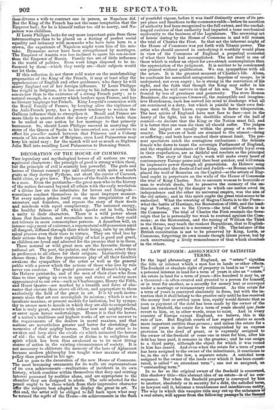THE ROYAL MATCHMAKER.
WiTyr or without cause, Louis Philippe has got the character of a managing papa—one who is constantly maneuvering to make good marriages for his sons and daughters. There is probably some truth in the imputation. He is among royal families as a new coronet among our nobility : he cannot feel comfortable and at home in the titled circle till intermarriages make him confident that he is really one of them. Something of the joy of the par- venu, favoured with a visit enfamille from one of the old peerage, may mingle with the natural politeness and sociability of the King of the French in his warm receptions of our Queen—the only crowned head of real old family by whom he has as yet been tutoye. A similar impulse made Napoleon anxious to become the son-in-law of the Emperor of Austria. Better form such con nexions in the persons of one's descendants, like Louis Philippe,
than divorce a wife to contract one in person, as Napoleon did. Rut the King of the French has not the same temptation that the Emperor had ; for he is himself rather too old to marry, and Na- poleon was.childless. If Louis Philippe looks for any more important gain from these intermarriages than to be placed on a footing of perfect social equality and intimacy with monarchs who have been born to a crown, the experience of Napoleon might warn him of his mis- take. Dynasties never have been strengthened by marriages. The Emperor of Austria was less inclined to spare his son-in-law than the Emperor of Russia. Family ties are of little influence in the world of politics. Even were kings disposed to be in- fluenced by them—which they rarely are—their subjects would not let them.
If this reflection do not throw cold water on the matchmaking propensities of the King of the French, it may at least allay the apprehensions of English and other quidnuncs, who fancy he will marry England out of her foreign influence. If Louis Philippe has weight in Belgium, it is less owing to his influence over his son-in-law than to the existence of a strong French party ; as is natural enough, in a country which borders upon France, and has no literary language but French. King Leopold's connexion with the Royal Family of France, by keeping alive the vigilance of the Anti-French party, has a greater tendency to weaken the Grallican influence than to strengthen it. Brazil and France are more likely to quarrel about the dowry of Joinville's bride than to be united as one nation by her marriage to that princely buccaneer. So, should Louis Philippe succeed in marrying the sister of the Queen of Spain to his unmarried son, or contrive to effect his pis-oiler match between that Princess and a Coburg cousin of his son-in-law of Belgium, even Lord Palmerston may keep his mind easy : for the match will not so much as frighten John Bull into recalling Lord Palmerston to Downing Street.



























 Previous page
Previous page